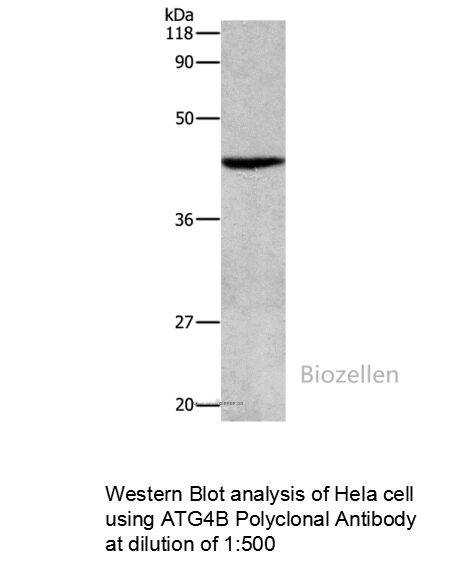| Synonyms | APG4 autophagy 4 homolog B,APG4B,ATG4 autophagy related 4 homolog B (S. cerevisiae),ATG4B,ATG4B,AUT like 1 cysteine endopeptidase,AUT-like 1 cysteine endopeptidase,AUTL1,Autophagin 1,Autophagin-1,Autophagy related 4B cysteine peptidase,Autophagy related cysteine endopeptidase 1,Autophagy related protein 4 homolog B,Autophagy-related cysteine endopeptidase 1,Autophagy-related protein 4 homolog B,Cysteine protease ATG4B,hAPG4B,MGC1353 |
| Swissprot | Q9Y4P1 |
| Source | Rabbit |
| Reactivity | Human,Mouse |
| Immunogen | Synthetic peptide of human APG4B |
| Application | WB,ELISA |
| Recommended dilution | WB 1:500-1:2000 |
| Concentration | 0.3 mg/mL |
| Clonality | Polyclonal |
| Cellular localization | Cytoplasm. |
| Tissue specificity | Mainly expressed in the skeletal muscle, followed by brain, heart, liver and pancreas. |
| Isotype | IgG |
| Purification | Affinity purification |
| Conjugation | Unconjugated |
| Storage instructions | Store at -20℃. Avoid freeze / thaw cycles. |
| Storage buffer | PBS with 0.05% sodium azide, 50% glycerol, PH7.3 |
| Background | Autophagy is the process by which endogenous proteins and damaged organelles are destroyed intracellularly. Autophagy is postulated to be essential for cell homeostasis and cell remodeling during differentiation, metamorphosis, non-apoptotic cell death, and aging. Reduced levels of autophagy have been described in some malignant tumors, and a role for autophagy in controlling the unregulated cell growth linked to cancer has been proposed. This gene encodes a member of the autophagin protein family. The encoded protein is also designated as a member of the C-54 family of cysteine proteases. Alternate transcriptional splice variants, encoding different isoforms, have been characterized. |
